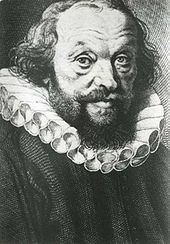Rupertus Wollenius
Rupertus Messenius , actually Peter Meiderlin , also called Petrus Meuderlinus (born March 22, 1582 in Oberacker , † June 1, 1651 in Augsburg ) was a Lutheran theologian and educator .
After attending school in Adelberg and visiting the lower Konvikt in Maulbronn, the son of a Swabian pastor studied at the Tübinger Stift , where he met Johann Valentin Andreae . Meiderlin was a student of the Old Testament writer Mathias Haffenreffer (1561-1619) and in 1601 obtained the degree of a master's degree . In 1605 he became a repetiteur at the monastery in Tübingen; In 1607 he took over the ancient philology professorship from the late Martin Crusius . After a position as senior deacon in Kirchheim unter Teck , he became Ephorus of the Protestant College of St. Anna in Augsburg in 1612 . He held this office with an interruption from 1630 to 1632 until 1650.
As a supporter of the concord formula , he defended the pioneer of Pietism Johann Arndt in the dispute over the orthodoxy of his teaching. In 1626, Meiderlin, as an Irishman , published a word of peace under the pseudonym Rupertus Wollenius under the title Paraenesis votiva pro pace Ecclesiae ad Theologos Augustanae Confessionis auctore Ruperto Reportio Theologo (Pleading admonition for church peace to the theologians of the Augsburg Confession), a word of peace in which he spoke about the warring parties called for unity in the sense of the concord formula and for observance of charity. It says:
- Verbo dicam: si nos servaremus in necessariis unitatem, in non necessariis libertatem, in utrisque caritatem, optimo certe loco essent res nostrae . (in F. Lücke p. 128, para. 223).
- (I say the word: in what is necessary we must maintain unity, in what is not necessary freedom, in both charity, so the best possible place for our cause will exist.)
That is why Friedrich Lücke proclaimed the author of the sentence in 1850
- In necessariis unitas, in dubiis libertas, in omnibus caritas .
- (In the necessary unity, in the doubtful freedom, in all charity.)
This assessment is now outdated. Since 1999 the priority Markantun de Dominis and his work De republica ecclesiastica libri X , Pars I. London 1617, lib. 4 cap. 8 page 676, awarded where it reads:
- Omnesque mutuam amplecteremur unitatem in necessariis, in non necessariis libertatem, in omnibus caritatem.
- (Everyone will embrace unity in what is necessary, freedom in what is not necessary, love in all things.)
Works
- Hearty memory of wisdom and validity: which is preferable to the other; held at an Exercitio Oratorio ... when the alumni of the Evangelical College in Augspurg had spoken about this matter in several and different languages and listed a remarkable problem ... ; Augsburg, 1622.
- The little catechism for the dump truckers … ; Augsburg, 1622.
- ... reflect on the Mr. Kipperer and usurpers ... ; Augsburg, 1623.
- Paraenesis votiva pro pace Ecclesia ad Theologos Augustanae Confessionis auctore Ruperto habeno Theologo ; printed by Hieronymus Körnlein, Rothenburg ob der Tauber, 1626 (published anonymously without information on year, place and publisher). Printed as an appendix by Friedrich Lücke : About the age, the author, the original form and the true meaning of the church's peace saying In necessariis unitas, in non necessariis libertas, in utrisque caritas . A literary-historical theological study ; Göttingen: Verlag der Dieterichschen Buchhandlung, 1850. books.google.de p. 87 ff.
- Laus sive Commendatio Collegii Augustani Evangelici S. Annae ; 1639.
literature
- Theodor Mahlmann: Reports, Rupertus. In: Biographisch-Bibliographisches Kirchenlexikon (BBKL). Volume 5, Bautz, Herzberg 1993, ISBN 3-88309-043-3 , Sp. 1202-1209.
- Robert Stupperich : Meiderlin, Peter. In: New German Biography (NDB). Volume 16, Duncker & Humblot, Berlin 1990, ISBN 3-428-00197-4 , p. 637 f. ( Digitized version ).
- Paul Tschackert : Reports, Rupertus . In: Allgemeine Deutsche Biographie (ADB). Volume 21, Duncker & Humblot, Leipzig 1885, p. 293.
- Marie Weitbrecht : Peter Meiderlin, Ephorus the Elder College at St. Anna, Augsburg in: Blätter für Wuerttemberg Church History , NF 33, p. 297 ff. Issue 3.4 Verlag Scheufele, Stuttgart, 1929
Web links
Individual evidence
- ↑ Friedrich Lücke : About the age, the author, the original form and the true meaning of the church's peace saying In necessariis unitas, in non necessariis libertas, in utrisque caritas . A literary-historical theological study ; Göttingen: Verlag der Dieterichschen Buchhandlung, 1850, p. 128. ( Digitized in the Google book search)
| personal data | |
|---|---|
| SURNAME | Meldius, Rupertus |
| ALTERNATIVE NAMES | Meiderlin, Peter (real name); Meuderlinus, Peter |
| BRIEF DESCRIPTION | German Lutheran theologian and educator |
| DATE OF BIRTH | March 22, 1582 |
| PLACE OF BIRTH | Oberacker |
| DATE OF DEATH | June 1, 1651 |
| Place of death | augsburg |
